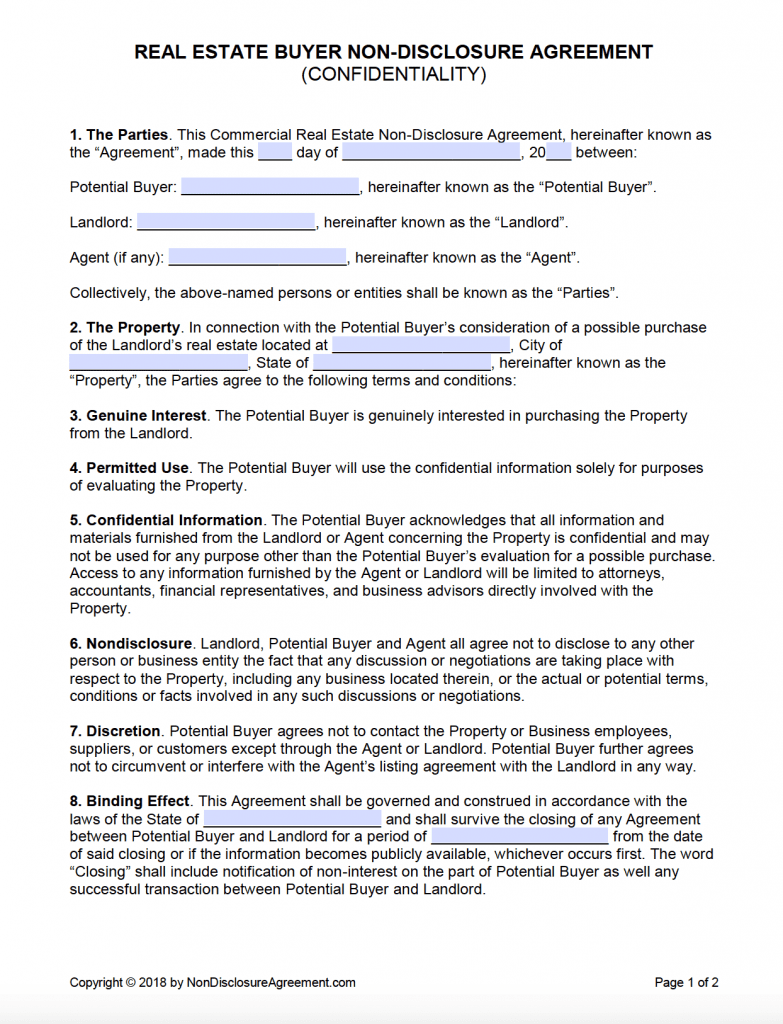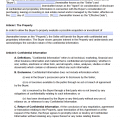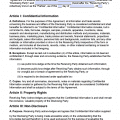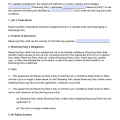Real Estate Buyer (Confidentiality) Non-Disclosure Agreement

The real estate buyer non-disclosure agreement is used when the seller of real estate discloses information about a property to potential buyers. The information may have to do with property revenue, taxes, marketing plans, planned capital improvements, the identity or financial status of investors or partners, or other confidential information that provides the seller with an advantage over similar property owners. When providing confidential information it should be labeled as “confidential.”
Landlord / Tenant NDA – Allows the landlord to negotiate and disclose all details of the property with the tenant liable to keep all records and information confidential.
Sample
REAL ESTATE BUYER (CONFIDENTIALITY) NON-DISCLOSURE AGREEMENT
This Real Estate Buyer (Confidentiality) Non-Disclosure Agreement (the “Agreement”) is made between _________________ (the “Seller”) and _________________ (the “Buyer”) and is effective _________________. The parties are contemplating a real estate sale for the property located at _________________ (the “Property”) and in the process, Seller may disclose proprietary and confidential information regarding the Property and the sale. This Agreement is intended to prevent the unauthorized disclosure of Confidential Information. “Confidential Information” is proprietary information disclosed by Seller and relating to the sale of the Property including but not limited to: revenue, taxes, marketing plans, planned capital improvements, the identity or financial status of investors or partners, or other information conveyed in writing or in discussion that is indicated to be confidential.
1. Buyer’s Obligations
Without Seller’s prior written consent, Buyer will not: (a) disclose Confidential Information to any third party; (b) make or permit to be made copies or other reproductions of Confidential Information; or (c) make any commercial use of Confidential Information. Buyer will carefully restrict access to Confidential Information to those people who are subject to non-disclosure restrictions at least as protective as those set forth in this Agreement and who clearly need such access to participate on Buyer’s behalf in the analysis and negotiation of an agreement with Seller. Upon Seller’s request, Buyer shall within thirty days return all original materials provided by Seller and any copies, notes or other documents in Buyer’s possession pertaining to Confidential Information.
2. Exclusions
This agreement does not apply to any information that: (a) was in Buyer’s possession or was known to Buyer, without an obligation to keep it confidential, before such information was disclosed to Buyer by Seller; (b) is or becomes public knowledge through a source other than Buyer and through no fault of Buyer; (c) is or becomes lawfully available to Buyer from a source other than Seller; or (d) is disclosed by Buyer with Seller’s prior written approval.
3. Term
This Agreement and Buyer’s duty to hold Confidential Information in confidence shall remain in effect until _________________ or until whichever of the following occurs first: (a) Seller sends Buyer written notice releasing it from this Agreement, or (b) Confidential Information disclosed under this Agreement ceases to be confidential.
4. Miscellaneous Provisions
(a) No Rights Granted. This Agreement does not constitute a grant or an intention or commitment enter into a real estate sale, nor does it grant any right, title or interest in the Property or the Confidential Information to Buyer.
(b) Relationships. Nothing contained in this Agreement shall be deemed to constitute either party a partner, joint venturer or employee of the other party for any purpose.
(c) Severability. If a court finds any provision of this Agreement invalid or unenforceable, the remainder of this Agreement shall be interpreted so as best to effect the intent of the parties.
(d) Integration. This Agreement expresses the complete understanding of the parties with respect to the subject matter and supersedes all prior proposals, agreements, representations and understandings. This Agreement may not be amended except in a writing signed by both parties.
(e) Waiver. The failure to exercise any right provided in this Agreement shall not be a waiver of prior or subsequent rights.
(f) Injunctive Relief. Any misappropriation of Confidential Information in violation of this Agreement may cause Seller irreparable harm, the amount of which may be difficult to ascertain, and therefore Buyer agrees that Seller shall have the right to apply to a court of competent jurisdiction for an order enjoining any such further misappropriation and for such other relief as Seller deems appropriate. This right of Seller is to be in addition to the remedies otherwise available to Seller.
(g) Attorney Fees and Expenses. In a dispute arising out of or related to this Agreement, the prevailing party shall have the right to collect from the other party its reasonable attorney fees and costs and necessary expenditures.
(h) Governing Law. This Agreement shall be governed in accordance with the laws of the State of _________________.
(i) Jurisdiction. The parties consent to the exclusive jurisdiction and venue of the federal and state courts located in _________________ in any action arising out of or relating to this Agreement. The parties waive any other venue to which either party might be entitled by domicile or otherwise.
(j) Successors & Assigns. This Agreement shall bind each party’s heirs, successors and assigns. Buyer may not assign or transfer its rights or obligations under this Agreement without the prior written consent of Seller. However, no consent is required for an assignment or transfer that occurs: (a) to an entity in which Buyer owns more than fifty percent of the assets; or (b) as part of a transfer of all or substantially all of the assets of Buyer to any party. Any assignment or transfer in violation of this section shall be void.
Seller:
_____________________________________________ (Signature)
_____________________ (Typed or Printed Name)
Title: _____________________
Date: _____________________
Buyer:
_____________________________________________ (Signature)
_____________________ (Typed or Printed Name)
Title: _____________________
Date: _____________________
How to Write
EXPLANATION FOR REAL ESTATE BUYER CONFIDENTIALITY AGREEMENT
Below we provide an explanation for each of the provisions in the Real Estate Buyer Confidentiality Agreement.
Introductory Paragraph
Fill in your name or company name (you are the Seller). Fill in the name of the individual or company considering purchasing the property (the Buyer). Finally, fill in the date the agreement will take effect. This is often the date that the last party signs the agreement. Fill in the address (or addresses if there is more than one property). This paragraph also defines what is protected against disclosure. Keep in mind that if you are providing documentation, you should designate that information as confidential. If the information is spoken, you should announce the confidentiality.
1. Buyer’s Obligations
This clause makes clear that your trade secrets must be kept in confidence by the Buyer and may not be revealed to others without your prior written consent. The Buyer also promises to return materials that you provided. The agreement gives the Buyer 30 days to return the materials, but you can change this time period if you wish.
2. Exclusions
This provision describes all the types of information that are not covered by the agreement. These exclusions are based on court decisions and state trade secret laws that say these types of information do not qualify for trade secret protection.
3. Term
This clause provides the Buyer with an expiration date for the agreement. The Agreement should last as long as the information is likely to remain a trade secret. Five years is a common period, but it can be much shorter, even as little as six months.
4. Miscellaneous Provisions
These miscellaneous provisions (sometimes referred to as “boilerplate”) are usually grouped together at the end of an agreement.
(a) No Rights Granted. This clause makes clear that you are not granting any ownership rights in the property or the confidential information to the Buyer.
bMost agreements include a provision like this one, disclaiming any relationship other than that defined in the agreement.
(c) Severability. The severability clause provides that if you wind up in a lawsuit over the agreement and a court rules that one part of the agreement is invalid, that part can be cut out and the rest of the agreement will remain valid.
(d) Integration. The integration provision verifies that the version you are signing is the final version, and that neither of you can rely on statements made in the past.
(e) Waiver. This provision states that even if you don’t promptly complain about a violation of the NDA, you still have the right to complain about it later.
(f) Injunctive Relief. An injunction is a court order directing a person to do (or stop doing) something. If someone violated your NDA, you would want a court order directing that person to stop using your secrets.
(g) Attorney Fees and Expenses. If you don’t include an attorney fees clause in your agreement, a judge may (in most states) order the award of attorney fees in cases where the theft of the trade secret was willful and malicious.
(h) Governing Law. You can choose any state’s laws to govern the agreement, though the most logical state for this provision is the state where the property is located.
(i) Jurisdiction. The purpose of adding a jurisdiction provision to an NDA is to get each party to consent in advance to jurisdiction in one county or state and to give up the right to sue or be sued anywhere else. As with the previous provision, the most likely choice is the county in which the property is located.
(j) Successors and Assigns. This provision binds any company that acquires either party.
Signing the agreement. Someone with the necessary authority must sign the agreement on behalf of each party. Each party should sign two copies and keep one. This way, both parties have an original signed agreement.




